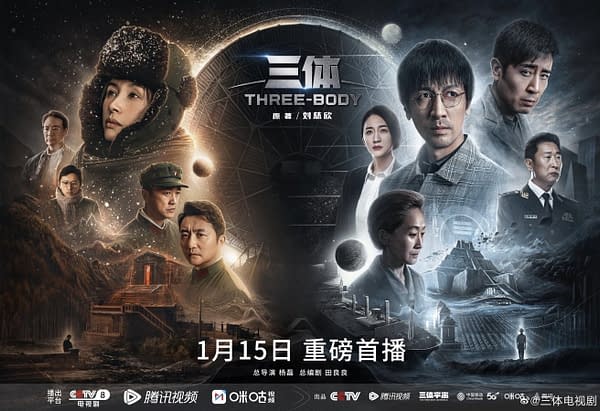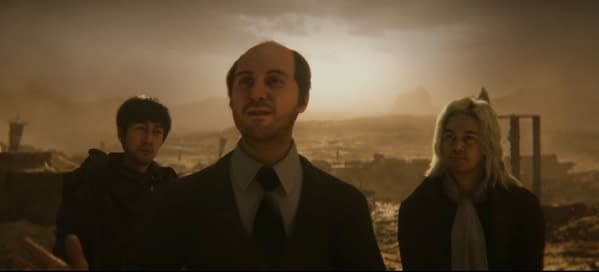The Three-Body Problem Thoughts: A Flawed But Essential Series
After reviewing all 30 episodes of The Three-Body Problem, here’s a look at why, though the series was flawed, it’s still essential viewing.
Well, it’s over. The Chinese television adaptation of Liu Cixin‘s epic Chinese Science Fiction novel The Three-Body Problem has completed its thirty-episode run on both broadcast television and streaming. In an act of possibly masochistic insanity, we reviewed all thirty episodes and became the only outlet in the West to do that. Why did we do that? Because we felt it was important. It isn’t just Hollywood or the UK that produces major television dramas. Here’s why it matters.

The Three-Body Problem is a Milestone in Chinese Science Fiction
The Three-Body Problem is the first modern Chinese Science Fiction saga that presented a modern China that looked forward instead of backward. It represented modern science-driven China and heralded the current boom in Chinese Science Fiction, putting it on the global map when it won the Hugo Award in 2015. It made Liu Cixin the pioneer of modern Science Fiction in China, and several of his stories were adapted into movies. The prize was still the Remembrance of Earth’s Past trilogy, of which The Three-Body Problem was the first book. A feature film adaptation was shot in 2018 but indefinitely shelved because of rumoured problems with the special effects. The Chinese TV adaptation took seven years to get off the ground because of the book’s inherent difficulties: it’s very dry, and the characters are often ciphers there to deliver Liu’s hard science high concepts and themes. What the makers of the series have done is faithfully adapt the book – though the censors forced them to leave out the scenes depicting the harshest effects of the Cultural Revolution and its effects on the story’s most important character – and add more personality, character motivation and emotional ties between the characters to ground the story in human context, improving on the book in the process.

Flaws and High Points
The adaptation of The Three-Body Problem is far from perfect. Its pacing is frequently slow and repetitive, allegedly because the producers originally planned a twenty- or twenty-two-episode season, but the broadcasters demanded a minimum count of thirty episodes. They were forced to omit nearly two hours of scenes set in the Cultural Revolution and had to scramble to edit the series to fit thirty episodes. Nearly all the Western characters are miscast and don’t even have the correct accents, which is a frequent problem with Chinese movies and television. Most Western actors look and sound like they were dragged out of the local expatriate bar to be cast with no regard for whether they’re convincing or not.
However, the parts of the series that work are as good as any British or Hollywood television show, often deftly introducing emotional nuance and subtext to the story where the book was lacking.

The Chinese Science Fiction Series that Fans Worldwide are Discovering
The Three-Body Problem was obviously produced primarily for the audience in China, but studio Tencent released the series to stream for free worldwide on their official YouTube channel, their streaming app, and the Viki streaming service. There has been no marketing to draw attention to it, and only people who are aware of Chinese drama know about it. It’s said to have over one hundred views in China, but it’s getting millions of views outside of China through word-of-mouth. The novel is the most influential Science Fiction saga since Frank Herbert‘s Dune. In China, it’s one of the biggest franchise IPs out there, with a whole ecosystem of collector’s items and merchandising in China that we’re not aware of in the West.
The Three-Body Problem is Invisible in the West
Apart from one condescending review in The New York Times, no Western media outlet apart from us has covered the series. Is The Three-Body Problem propaganda? Yes, but only in the sense that any show from any country is propaganda for its own culture. Some people might refuse to watch it because it comes from China. Perhaps it’s being ignored because of anti-China bias in Western media. Netflix has an adaptation of the book supposedly coming out later in 2023, but it’s odd that there hasn’t been a teaser trailer for it. At this point, nobody who has seen the Chinese series believes the Netflix version will be any good since its predominantly Western cast suggests it won’t have the Chinese point of view at the heart of the story. The showrunners are Weiss and Benioff, whom viewers accused of running Game of Thrones into the ground and are thus not optimistic. We’re willing to give the Netflix version a fair shake if it comes out. Otherwise, the Chinese version is already considered the definitive adaptation.
For all the latest Comics News Click Here
For the latest news and updates, follow us on Google News.

